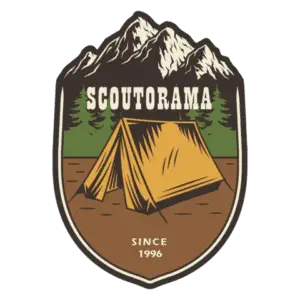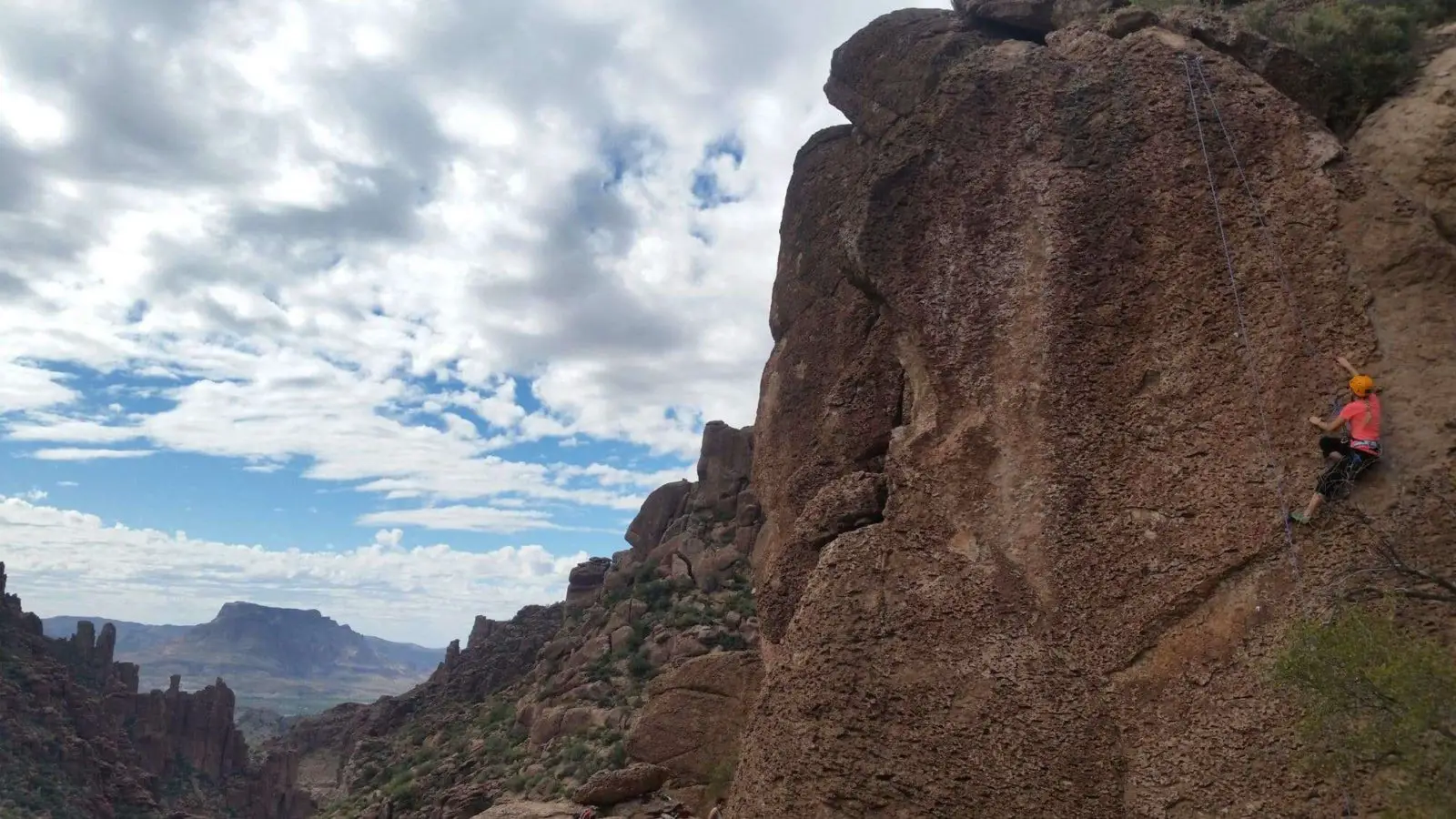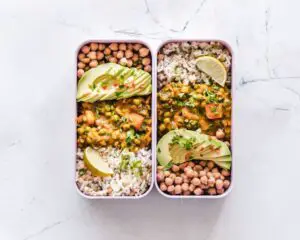I am a Registered Dietitian Nutritionist, and a rock climber. This post is all about rock climbing and protein- discover the best protein intake for your type of climbing. This post includes protein recommendations and ideas, sample menus, and a free meal plan for climbers. When and what do you eat before and after climbing? I’ll answer all of your questions below.
If you’re interested in checking out the best gear for climbing, click here .
.
The Best Diet for Rock Climbers – with a FREE One-Day Meal Plan
Wondering how to maximize your training for optimal athletic performance? Nutrition is the other piece of the puzzle and should be a top priority, just like your training efforts. The proper diet can help maximize performance and increase endurance and strength.
Protein is a necessary nutrient for athletes, needed in correct amounts at correct times throughout the day. Climbers especially need to consider improvements to their protein intake and plan an appropriate diet to get the amount they need in order to maintain and build lean body tissue.
Poor nutrition will eventually lead to poor performance. With the increasing popularity of vegan and vegetarian diets among climbers, a well-planned protein nutrition regimen can help you maximize your climbing capabilities.
This post answers the question of how much protein a climber needs, helps you calculate your protein requirements, and provides examples of how to reach your protein intake with food and supplements. I also provided a FREE sample meal plan, vegan/vegetarian meal plan, and described what and when to eat before and after rock climbing, and if rock climbing can help you lose weight.
As a registered dietitian nutritionist, I am a nutrition expert and have written many meal plans. These diet recommendations are aimed to fit the needs of most serious climbers. That being said, these are not individualized recommendations and will not necessarily meet everyone’s needs as each situation is different. Experiment with what works best for you.
If you have additional concerns, meet with a registered dietitian nutritionist one-on-one to figure out a individualized plan that meets your needs. Keep reading for some ideas and start experimenting with what works for you and your training regimen. See Also: How Much Do Rock Climbers Weigh?
How Much Protein Does a Climber Need?
Whatever the type of sport, athletes are expending energy and need additional nutrients, such as protein, to fuel exercise and recover from intense activity. Protein is important to help repair and strengthen muscle tissue.
High protein diets which are popular among athletes, aren’t usually necessary. While protein is critical in an athlete’s diet, more doesn’t necessarily mean better.
Protein needs are higher in athletes than non-athletes, but probably not as high as you might think. If an athlete eats too much protein, the body relies on using protein for energy- which is not as efficient and means that protein cannot be used to build muscles.
If instead you focus on a healthy balance of carbohydrates, protein, and fats, then carbohydrates will mainly be used as the muscle’s fuel source (most efficient) and protein will be used to maintain and strengthen lean body mass.
Protein intake is important for athletes because it enhances muscle repair and growth after a hard training session. Protein recommendations vary depending on the type of athlete, body weight, total energy intake, weight goals, exercise intensity and duration, age, etc. The amount of protein required for athletes also depends on the type of athlete- strength or endurance.
With climbers, there’s not a perfect answer of how much protein they need because rock climbing can be a mix of endurance and strength. Protein recommendations for rock climbers can vary, depending on the type of climbing you primarily do.
Endurance athletes need 1.2-1.4 grams of protein per kilogram of body weight per day. For climbers, that means most types of climbing like sport climbs, multi-pitch climbs, long routes, most gym climbers etc.
Strength and power athletes need 1.2-1.7 grams of protein per kilogram of body weight per day. This would be mostly for bouldering and gym workout days.
Using these numbers I’ve calculated the amount of protein (below) that will fit the needs of most rock climbers. Depending on body size and activity level, rock climbers need 80-120 grams of protein per day. That’s around 10-20% of your total calorie intake from protein.
Also, with a greater number of hours and intensity of training more protein is required, up to about 2 grams of protein per kilogram of body weight per day (this is the maximum amount, don’t go above 2 grams/kg!).
Math lesson- Calculate Your Protein Needs as a Rock Climber:
1.2-1.7 grams of protein per kilogram of bodyweight? How much protein is that?
Let’s say the average climber is 150 pounds.
To convert that into grams of protein per day, take your weight in pounds and divide it by 2.2 to convert to kilograms 150lbs/2.2= 68.18 kgs
and then multiply that number by the recommended amount of protein per kg (above). 68 kgs x 1.2 grams = 82 grams of protein per day (lower limit)
68 kgs x 1.7 grams = 116 grams of protein per day (upper limit)
So a 150 pound rock climber would need anywhere from 82-116 grams of protein per day.
That seems like a lot of protein, and it is, but chances are you are already getting plenty of protein and hitting that amount. Most climbers don’t need to tremendously change their diets in order to get more protein. Try keeping track of your food intake for a week or two on a food tracker app (like MyFitnessPal or Noom) and see where your protein intake averages per day.
What that amount of Protein Looks Like in a Day: So let’s use my math above and say the average climber needs around 82-116 grams of protein per day. For athletes, protein amount is just as important as protein timing. Since our bodies don’t store extra protein, protein intake should be spaced throughout the day every 2-4 hours with about 15-30 grams during meals and 15 grams during snacks.
Sample Schedule of Protein Intake for a Rock Climber:
Breakfast – 20 to 30 grams of protein
Snack – 15 grams of protein
Lunch- 20 to 30 grams of protein
Snack – 15 grams of protein (this could be your pre-climbing workout snack, assuming that you climb before dinner)
Dinner- 20 to 30 grams of protein
To make things even easier for you, I’ve created a list of food ideas that provide the appropriate amount of protein. Examples of 15-30 grams of protein:
- About 1 scoop of protein powder (mixed with milk, water, oatmeal, yogurt, or in a protein shake or smoothie)
- 1 protein bar (look for protein bars with 15-20 grams of protein, less than 9g of sugar, and less than 5g of saturated fat)
- About 1/2 cup of hummus with vegetables, crackers, and cheese
- About 2 cups of milk or servings of dairy =
- 2 slices of cheese with crackers
- 2 cups regular yogurt with fruit/granola
- 1 cup cottage cheese with fruit
- 1 cup of Greek yogurt
- 2-3 hard-boiled eggs
- 1/2 cup of nuts or trail mix (but careful with nuts, that’s also a LOT of calories!)
- 4 Tablespoons of peanut butter- eat with crackers, apples, and celery (also high in calories)
- 2-4 oz of chicken – about a medium-sized chicken breast
- 3 oz can of tuna with crackers
- 2 cups chocolate milk
- 1-2 string cheese with a handful of almonds
- 3/4 cup cottage cheese with fruit
- 1 cup edamame
What about protein supplements? I included protein powder and protein bars on the list of ideas because sometimes it’s just an easy way to get protein, especially after a gym session. Protein supplements are useful when rock climbers need immediate protein right after a workout and don’t have time for a meal.
However, protein supplements are not necessary. It’s almost always better to get high-quality proteins from food rather than from supplements. That being said, I definitely use protein powders and protein bars on occasion for convenience. I listed my favorite kinds below.
What are the best protein supplements for a rock climber? My favorite protein powders are milk-derived whey protein isolate. There’s also casein, egg white, and soy protein isolate as protein options. Look for one that meets your nutritional needs.
Some great protein powder choices are (click to view on Amazon): NAKED , Orgain
, Orgain , Swanson, Optimum Nutrition
, Swanson, Optimum Nutrition , Garden of Life.
, Garden of Life.
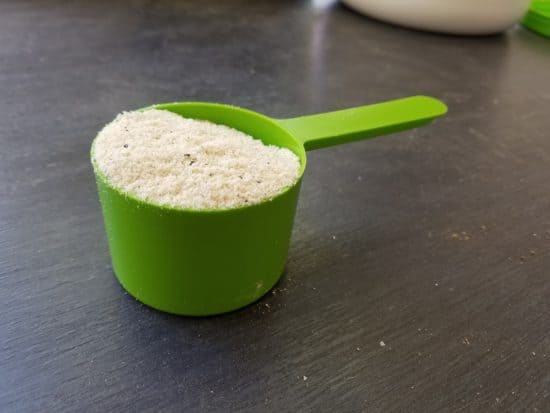
Keep reading for vegan and vegetarian options for plant-based protein powders.
What are the best protein bars for a climber? Perfect Bar , RXBAR
, RXBAR , and Clif Bar
, and Clif Bar are some of my favorites. (I also like LARABAR
are some of my favorites. (I also like LARABAR but they are lower in protein).
but they are lower in protein).
Most athletes get the recommended amount of protein through food, without using supplements. Protein powders and supplements are great for convenience, but are not always necessary, even for elite athletic performance.
Your body cannot adequately store extra protein that you consume, so if you eat too much protein powder you’re just wasting money on expensive supplements. Try to get a balanced diet with protein spaced throughout the day.
If you aren’t a serious rock climber, you probably don’t need to worry about changing up your diet. If you only climb once a week or so, you don’t need lots of extra protein. After a hard session at the gym or at the crag just make sure you have a balanced snack and plenty of water and you’ll be fueling your body adequately.
What Should a Climber Eat?
Rock climbers require anywhere from about 2,400-4,000 calories per day, depending on factors like age, gender, size, and physical activity. Climbers should focus on complex carbohydrates, lean proteins, and healthy fats.
Complex carbohydrates- Choose whole grains like whole wheat bread, brown rice, quinoa, oatmeal, etc. Limit your consumption of white breads, pastas, and crackers as well as overly processed foods, sugary candies and desserts.
Lean proteins- Choose lean red meats, poultry, fish and other high-quality proteins such as dairy and eggs. Plant-based protein choices include soy, quinoa, beans, lentils, seeds, and nuts.
Healthy fats- Try to avoid trans fats and limit saturated fats. Get the majority of your fat calories from unsaturated fats such as olive oil, fatty fish, avocados, seeds, nuts, etc.
See this sample meal plan for an idea of a balanced diet for a serious rock climber-
One-Day Meal Plan for Rock Climbers:
Breakfast- 1 cup oatmeal with raisins and cinnamon and flax seeds, protein shake with 1 scoop protein powder
Snack- small handful of nuts and an apple
Lunch- rice bowl with 1 cup brown rice, 1/2 cup black beans, 3 oz shredded chicken, 1 cup leafy greens, 1/2 tomato or salsa, 1/2 cup veggies, cheese, 1/2 avocado
Snack- banana, string cheese, and 6 whole-wheat crackers
Dinner- 1 medium-size baked sweet potato, 3 oz salmon, 1 cup roasted veggies with hummus Also be sure to drink plenty of fluid during the day- water is best!
FREE One Week Meal Plan for Climbers:
This meal plan provides 3000 calories per day with about 800 calories for each meal, and 100-300 calories at each of the 3 snacks. This is just an example to get you started! Try it out and see how you feel. Many athletes may need more or less calories depending on their weight and height, level of activity, and other personal goals. You may need to adjust the meal schedule based on the time you train. Based on individual preference and tolerance, you may also want to eat less/more calories at certain meals and snacks.
On rest days, you’ll probably need to lower your total calorie level because less energy is needed with less physical activity. I suggest eliminating 1 or 2 snacks, or eating less at snacks.
With this rock climber meal plan, you’ll also see that I included a variety of favorite foods- pasta, pizza, tacos, etc. but with healthier spins and all in an appropriate balance. Rock climbers don’t need to be on a diet, they just need to eat smarter.
Hope you find this helpful! It can be a great starting place as you make an individualized plan.
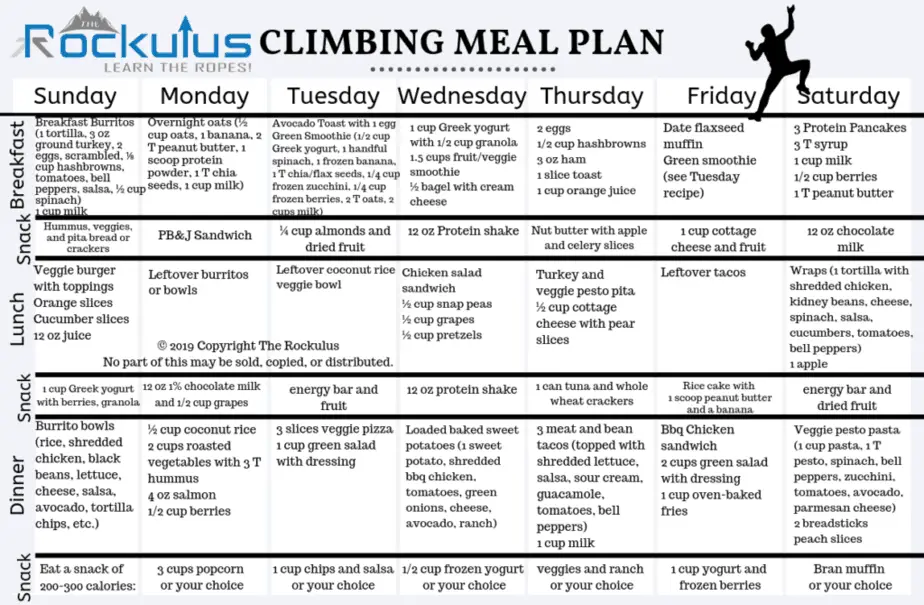
Or click here to view larger and download a pdf version to print.
Here’s some 100-300 calorie snack ideas to go with the meal plan:
- 1/4 cup hummus with 6 whole wheat crackers and veggies
- 12 oz protein fruit smoothie
- 1 cup Greek yogurt with granola and fruit
- 1 cup low-fat cottage cheese and fruit
- 1/4 cup trail mix
- 1/4 cup almonds and 1 apple
- 1 banana or apple with 1 T peanut butter
- string cheese and 8 whole wheat crackers
- 1.5 cups cereal and 1 cup milk
- 12 oz chocolate milk
- string cheese and Apple
- 1/2 cup pretzels and 1 T peanut butter
- PB&J sandwich
- energy bar
- 1 cup juice and 2 hard-boiled eggs
- rice cake with 1 T nut butter and banana
- string cheese and 4 oz applesauce
Best Meal Plan for Vegan and Vegetarian Rock Climbers:
I know a good handful of serious rock climbers are vegan/vegetarian. Since it’s common for climbers to have plant-based diets, I wanted to provide some recommendations for these climbers.
Protein and iron are important nutrients of focus for a vegan or vegetarian athlete’s diet. A vegetarian athlete with a specific menu plan will get all the essential nutrients they need to perform at their best ability. A well-planned diet is crucial for vegans and vegetarians. Instead of consuming dairy, eggs, and meats, a vegetarian or vegan needs to look elsewhere for protein sources. Almond milk is popular, but is quite low in protein.
Plan appropriate plant-based proteins for the best diet. It’s important to get a balance of nutrients throughout each meal. Vegetarians can get complete proteins from soy-based foods. Vegetarians often focus on complementary proteins to ensure they are getting all of the essential amino acids to build and maintain muscle tissue. Complementary proteins (combinations of grains and legumes) do not need to be consumed in the same meal, but throughout the day for an overall balance of essential amino acids.
Here’s my sample rock climbing diet adjusted for vegans and vegetarians: Breakfast- 1 cup oatmeal with raisins and cinnamon and flax seeds, protein shake with 1 scoop vegan protein powder (perhaps pea protein or other plant-based)
Snack- small handful of nuts and an apple
Lunch- grain bowl with 1 cup quinoa, 1/2 cup black beans, 1/2 cup TVP (awesome vegetable-based protein), 1 cup leafy greens, 1/2 tomato or salsa, 1/2 cup veggies, 1/2 avocado, handful of crushed blue-corn tortilla chips
(awesome vegetable-based protein), 1 cup leafy greens, 1/2 tomato or salsa, 1/2 cup veggies, 1/2 avocado, handful of crushed blue-corn tortilla chips
Snack- banana and crunchy chickpeas or edamame snacks
Dinner- 1 medium-sized baked sweet potato, 1/2 cup roasted tofu, 1 cup roasted veggies and hummus
Some great substitutions for meat in popular poultry and meat-based dishes are tofu, tempeh, soy products like TVP (textured vegetable protein ), veggie burgers, roasted cauliflower, beans, lentils, mushrooms, eggplant, etc.
), veggie burgers, roasted cauliflower, beans, lentils, mushrooms, eggplant, etc.
Vegans would also avoid whey-based protein powders because of the milk content.
My favorite plant-based protein powders are easily found on Amazon: PlantFusion , Vega One
, Vega One , Garden of Life
, Garden of Life , Tone it Up (for women)
, Tone it Up (for women) , or Now Sports Pea Protein
, or Now Sports Pea Protein (click to view on Amazon)
(click to view on Amazon)
My recommended plant-based protein barsare 22 Days Nutrition, Garden of Life
Garden of Life , and Orgain.
, and Orgain.
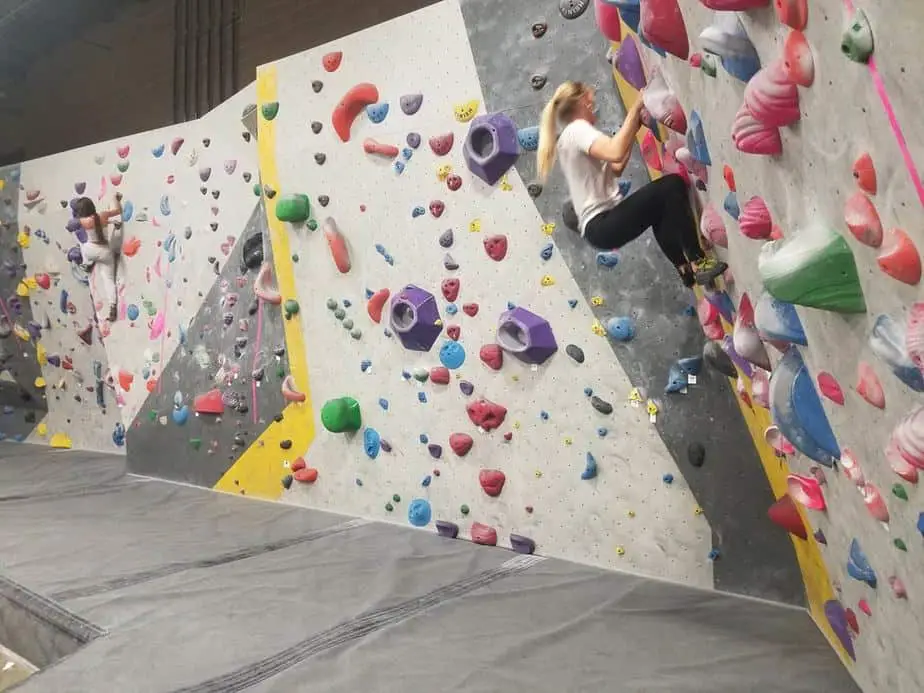
Related Questions:
What Should I Eat Before Rock Climbing?
If you are climbing in the morning, choose a healthy balanced breakfast. You’ll want to fuel up about 1-2 hours before climbing on healthy carbohydrates and lean protein to give you the energy you need during your climbing session.
Great ideas include pancakes and fruit, oatmeal and a hard-boiled egg, green smoothie and toast, peanut butter sandwich and a banana, whole wheat cereal with fruit and milk, veggie omelette and toast, or Greek yogurt with granola and berries.
If you climb in the afternoon, plan for a meal about 2-4 hours before rock climbing with another snack right before. Examples include: a deli sandwich with meat and cheese, pasta with meat sauce and veggies, a peanut butter sandwich and banana, a veggie wrap with shredded chicken, a baked potato and chicken.
A healthy, balanced meal for lunch will provide you with enough energy for rock climbing in the afternoon/evening, but add a little snack as a nutritious boost about 15-30 minutes before you hit the crag or the gym. Great snack ideas include a banana, trail mix, a peanut butter and jelly sandwich, apple with almond butter, or hummus and crackers with about 8 oz of water.
Water is the best choice for hydration if you climb for 1 hour or less, but if you are climbing for more than an hour in the heat, you might want to stay hydrated with a sports drink. Drink 4-8 ounces every 20 minutes.
When Should You Eat Before Climbing?
You don’t want to eat too soon that you are climbing on a full stomach or have stomach discomfort during rock climbing. As mentioned before, it is best to eat a meal 2-4 hours before a long training session with an added snack 30 minutes to 1 hour before climbing. Experiment and see what time frame works for you, especially if you are a competitive climber.
What Should I Eat After Rock Climbing?
After rock climbing, refuel with carbohydrates, protein, and fluid. If you are heading home for a meal within a couple of hours, you don’t necessarily need a post-climbing snack. A balanced meal will provide all the necessary nutrients you will need for your body to recover and refuel.
If you aren’t eating a meal soon, you’ll want a snack within 30 minutes to 2 hours after you finish a long climbing session. Choose low-fat chocolate milk, Greek yogurt with fruit, a small handful of dried fruit and nuts, a protein shake, whole-wheat crackers and string cheese, a peanut butter sandwich, or other favorite snacks that include carbohydrates and protein.
Can I Lose Weight By Rock Climbing?
Rock climbing could potentially help you lose weight. Any type of exercise can help you lose weight as long as you are burning more calories than you are consuming. If you aren’t resting very much between climbs, you could burn anywhere from 400-900 calories per hour. If you also eat about 500 calories less per day, then you could reasonably lose about 1-2 pounds per week while rock climbing.
Rock climbing is a good exercise to complement any weight loss plan, it combines cardio and strength for a great workout. Add in healthy eating and you can start losing some weight.
If you are a beginning climber you probably won’t burn as many calories while rock climbing, but any type of exercise will still be beneficial to your weight loss goals. Overall, the best type of exercise for weight loss is the type that you enjoy and will commit to.
How do you fuel your body before climbing?
Check out some of our other rock climbing posts:
How Much Does Rock Climbing Cost?
Is Indoor Rock Climbing Dangerous?
Can I Go Rock Climbing While Pregnant?
Can Rock Climbing Shoes Get Wet?
References:
- Academy of Nutrition and Dietetics: “3 Easy Tips for Fueling Your Workout Without Overdoing It.”
- Academy of Nutrition and Dietetics: “Timing Your Pre- and Post-Workout Nutrition.”
- Academy of Nutrition and Dietetics: “Protein and The Athlete- How Much Do You Need?”
